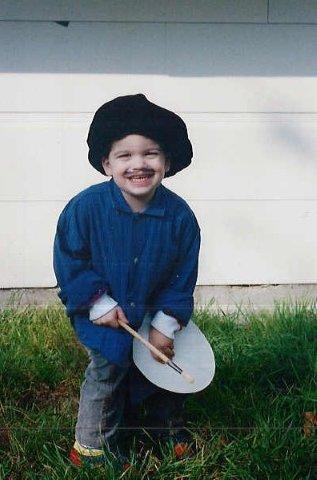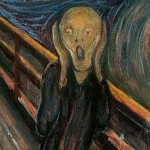My Photo, 1991
Over on Facebook, Melanie Bettinelli — the wise and graceful blogress at The Wine Dark Sea — posted this article from Psychology Today on Why French Kids Don’t Have ADHD, or at least not the way American kids seem to have it.
To the extent that French clinicians are successful at finding and repairing what has gone awry in the child’s social context, fewer children qualify for the ADHD diagnosis. Moreover, the definition of ADHD is not as broad as in the American system, which, in my view, tends to “pathologize” much of what is normal childhood behavior. The DSM specifically does not consider underlying causes. It thus leads clinicians to give the ADHD diagnosis to a much larger number of symptomatic children, while also encouraging them to treat those children with pharmaceuticals.
The French holistic, psycho-social approach also allows for considering nutritional causes for ADHD-type symptoms—specifically the fact that the behavior of some children is worsened after eating foods with artificial colors, certain preservatives, and/or allergens. Clinicians who work with troubled children in this country—not to mention parents of many ADHD kids—are well aware that dietary interventions can sometimes help a child’s problem. In the United States, the strict focus on pharmaceutical treatment of ADHD, however, encourages clinicians to ignore the influence of dietary factors on children’s behavior.
Yes. Emphasis mine; Americans seem to fear “normal childhood behavior”, possibly because it is too free, imaginative, and constructively fiendish in a world already hostage to the tyranny of “shh, be nice!” Nice, in childhood, is a fleeting thing as a growing human is learning how to balance dark and light.
But what really struck me was this:
French parents have a different philosophy of disciplinine. Consistently enforced limits, in the French view, make children feel safe and secure. Clear limits, they believe, actually make a child feel happier and safer—something that is congruent with my own experience as both a therapist and a parent. Finally, French parents believe that hearing the word “no” rescues children from the “tyranny of their own desires.”
Oh, snap! Emphasis mine. This is the efficacy of the word “no”. It is useful; it is necessary. In America, we think it is nothing but mean and — most erroneously, this thought — “unloving.”
But love is at the heart of a disciplined, and reasoned “no”, because it rescues us from our foolhardiness; it diminishes our pride; it shrinks the ego; it reduces the illusion that we are the one we have been waiting for.
In Strange Gods, I ask at one point, “what has ‘no’ every created, but Hell?” In the context of my argument, it is a sensible question, because “no” does not create. Creation must be the ‘yes’ that rides on Intention. “No” does not grow a thing or a created creature; it grounds it.
Which is why things like the Ten Commandments and the Catholic Church — which are actually created in God’s intention of “Yes” — must rightly, logically, contain the grounding element of “no.” The French parents understand it in the micro; the church understands it in the macro: “The Catholic Church,” wrote Gilbert Keith Chesterton, “is the only thing that frees a man from the degrading slavery of being a child of his age.”
Yes. And thank God for it.
UPDATE:
Elizabeth Duffy takes issue:
Dr. Wedge asks the question:
“Is ADHD a biological-neurological disorder? Surprisingly, the answer to this question depends on whether you live in France or in the United States.”
In case you didn’t catch that–the author did not provide an answer. She then goes on to detail the way ADHD is treated in America and in France, with a pretty firm bias on the French method that goes hand in hand with the current fashion for all things French.
So I’m not sure why she makes the next leap that she does, which is to provide a hyper-generalized picture of the way Americans parent that places blame for the ADHD diagnosis on parental sins ranging from offering their kids snacks to not letting their babies cry it out at night.
I cannot help feeling like this is a case of, “When in doubt, blame the parents,” which is, of course, the easy way out (since the monolithic group of parents-who-do-everything-wrong is beyond the reach of reasonable treatment). It also provides a critical platform for people who are annoyed by children in general, and even more so, by sloppy parenting.













